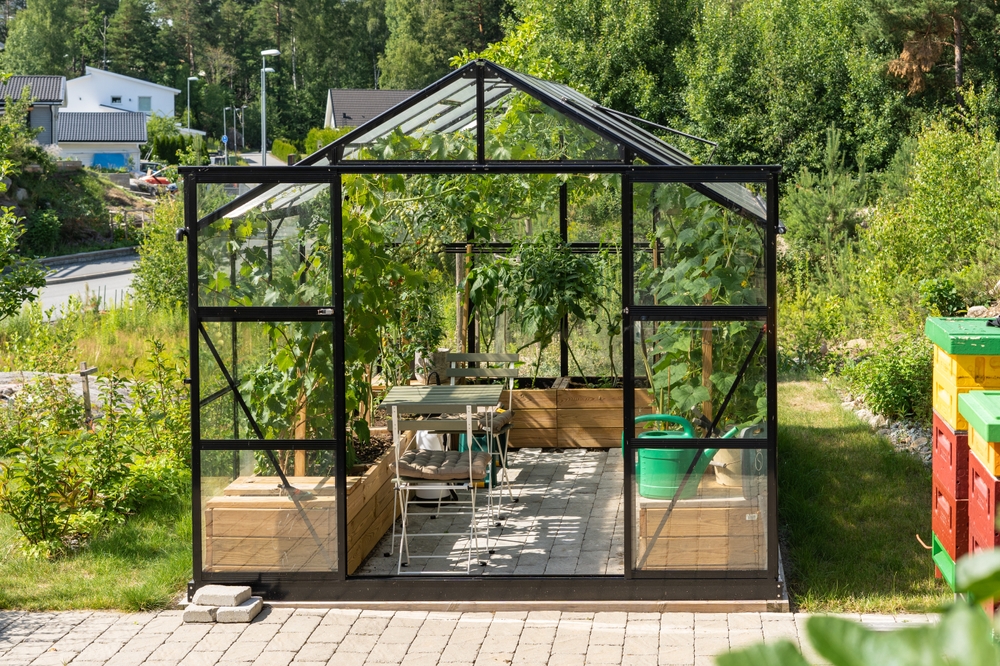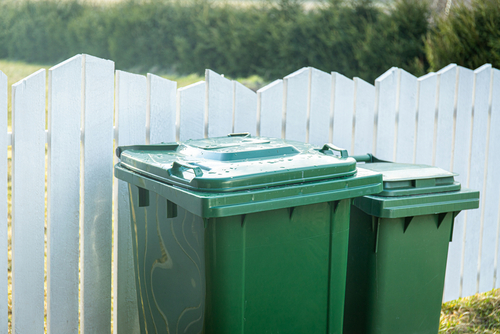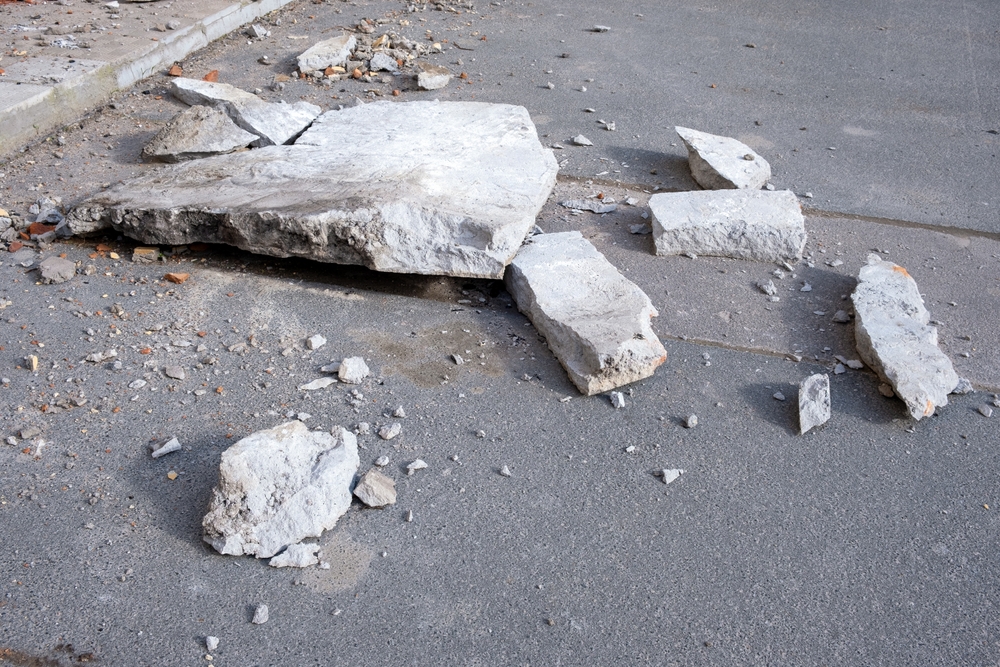April 18, 2024 - Benjamin Ehinger
Garbage Can Sizes: Choosing the Right Capacity for Your Needs
CALL NOW 844-762-8449
Choosing the right garbage can size is essential whether you’re tossing a paper towel in the bathroom or wheeling out the weekly trash to the curb. The perfect fit not only ensures efficiency but also helps in maintaining cleanliness and organization in your home. Through a wide range of sizes, each trash receptacle has its place, tailored to meet the demands of different spaces and types of waste. From compact bins that discreetly fit under a desk to massive roll-away containers, understanding the scale of your needs is the first step to waste management.
In the kitchen, you want a garbage can that can handle daily waste without constant emptying, yet fits smoothly into your space. For smaller areas like a bathroom or office, compact bins suffice, often holding just a few gallons and blending in without notice. When looking at the larger end of the spectrum, outdoor trash cans and dumpsters enter the scene, designed for holding several weeks’ worth of household waste or managing larger disposal projects. The size you select here will depend on the volume of waste you typically produce and the frequency of your trash collection service.
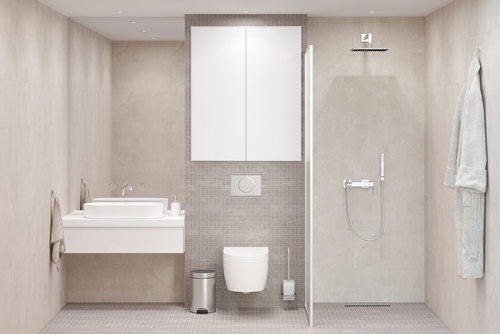 When selecting a bathroom trash can, you’ll want to consider both the size of the container and how it will manage waste discretely, especially in terms of containing odors.
When selecting a bathroom trash can, you’ll want to consider both the size of the container and how it will manage waste discretely, especially in terms of containing odors.
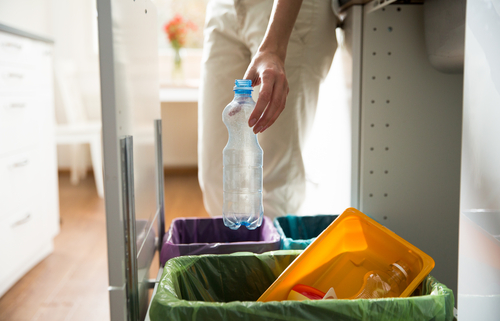 When selecting trash cans for specific needs, it’s important to consider options designed for recycling programs and organic waste management. The size of the container should match the volume of recyclables or compostables you generate.
When selecting trash cans for specific needs, it’s important to consider options designed for recycling programs and organic waste management. The size of the container should match the volume of recyclables or compostables you generate.
When you require a dumpster rental, turn to reliable local services like Waste Removal USA for a range of options. Remember, the size of your dumpster should match the scale of your project to be cost-effective and to manage waste disposal efficiently.
When in doubt, consulting with professionals can guide you to the appropriate dumpster size, ensuring all your waste is managed without exceeding the container’s limits, thus maximizing safety and compliance.
Key Takeaways
- The right-sized garbage can improves home efficiency and cleanliness.
- Kitchen and bathroom trash can sizes vary, catering to different needs and space constraints.
- Outdoor and dumpster sizes accommodate larger waste needs and project-based disposals.
Understanding Trash Can Sizes
Selecting the appropriate trash can size for your needs involves understanding the capacity and dimensions. This ensures efficient waste management and convenience in your home or workplace.Capacity and Volume
Capacity refers to how much a trash can holds and is typically measured in gallons. The volume dictates the frequency of disposal required. For example, a smaller capacity can like 7 to 10 gallons may need daily emptying in a busy area, while a 20 to 30 gallon trash can might suffice for weekly disposal.- Small Cans (7-10 gallons): Ideal for personal workspaces or bathrooms. Typically around 12 to 15 inches tall.
- Medium Cans (12-16 gallons): Great for under counters in a kitchen or common areas. Heights can vary from 20 to 30 inches.
- Large Cans (20-30 gallons): Suitable for kitchens with higher traffic or small businesses. These can stand between 29 to 34 inches tall.
Common Sizes by Gallon
Trash cans come in various sizes, each fitting different needs:- Regular Trash Cans:
- 13 gallons: A common residential size, fitting for kitchen use with enough volume to prevent constant emptying. Dimensions are usually about 28 inches high and 14 inches in diameter.
- 20 gallons: Offers a balance between capacity and space used, often found in larger kitchens or communal spaces. Measures approximately 29 inches in height and 16 inches wide and deep.
- Outdoor and Curbside Trash Cans:
- 50 to 65 gallons: For families or offices, these large bins are designed for curbside disposal and typically have wheels for easy transportation.
- Large Commercial or Outdoor Trash Cans:
- 32-44 gallons: These are durable, able to handle significant waste in industrial or recreational spaces, often with dimensions allowing for use in designated outdoor waste storage areas.
- 10 Yard Dumpsters: Suitable for small renovation projects or medium-sized cleanouts, possibly fitting in a residential driveway.
- 20 Yard Dumpsters: A mid-range option, ideal for larger home cleanout projects or light construction debris.
- 30 Yard Dumpsters: Frequently used in construction and commercial cleanouts, offering ample space for bulky items.
- 40 Yard Dumpsters: The largest standard size, utilized for significant construction projects, large cleanouts, and commercial waste removal efforts.
Selecting a Kitchen Trash Can
When choosing a kitchen trash can, it’s essential to consider the size and functionality that align with your kitchen’s needs and activities.Sizing for Kitchen Spaces
Your kitchen trash can should accommodate the volume of food waste generated daily. Small kitchens may require compact units, whereas larger kitchens can house big trash cans. A 7 to 10-gallon trash can is sufficient for smaller households, ideally fitting under the sink or in a pantry. Medium-sized kitchens benefit from a 12 to 16-gallon trash can, which fits well at the end of a counter or in a cabinet. For busy kitchens with higher waste output, select a 20 to 30-gallon trash can to minimize the frequency of taking out the trash. Key dimensions to consider:- Height: Ensures the trash can fits under counters or in allocated spaces.
- Width and Depth: Important for rectangular trash cans to fit in specific kitchen spots.
Features and Functionality
A kitchen trash can’s features enhance its functionality and your overall experience. Look for a lid to contain odors and a foot pedal for hands-free operation. Rectangular trash cans often fit more conveniently into kitchen layouts than round ones. If you wish to segregate recycling or compost, select trash cans with multiple compartments. Features to consider:- Lid: Keeps unwanted pests out and locks odors in.
- Compartments: Allows for easy waste separation.
- Trash Bag Fit: Ensures a snug fit to avoid slippage and spills.
Bathroom Trash Can Considerations
 When selecting a bathroom trash can, you’ll want to consider both the size of the container and how it will manage waste discretely, especially in terms of containing odors.
When selecting a bathroom trash can, you’ll want to consider both the size of the container and how it will manage waste discretely, especially in terms of containing odors.
Bathroom-Specific Sizes
Your bathroom trash can should match the size of the space and the volume of waste typically generated. Here are sizes you may consider:- Small trash cans: Ideal for bathrooms with limited space or low traffic. Typically ranging from 2 to 4 gallons.
- Standard sizes: Often around 5 gallons, suitable for average-sized bathrooms.
- Bigger options: In busier bathrooms, a 7-gallon trash can may be more appropriate.
Discretion and Odor Control
A good bathroom trash can should keep waste hidden and control odors.- Lids: Essential for maintaining discretion, containing smells, and overall cleanliness. A lid will also keep the contents out of sight.
- Materials: Choose materials that are easy to clean, as this will help in minimizing odors.
Trash Cans for Office and Public Spaces
When selecting the right garbage can for either an office setting or public space, considering capacity and design is crucial to meet the needs of the environment and its users.Office Size and Capacity
For your office, assessing the size and capacity of your office trash cans is vital. Smaller offices typically require cans ranging from 7 to 12 gallons, sufficient for everyday paper waste like snack wrappers, notes, and mail. For larger offices or those with a higher volume of office supplies turnover, trash can sizes might need to increase to 20 gallons or more to accommodate the additional waste without necessitating constant emptying.- Personal Desk Cans: 2-7 gallons
- Common Area Cans: 7-12 gallons
- Large Office Bins: 20+ gallons
Public Space Design
In public spaces, the priority shifts to receptacles that can handle a diverse range of waste while withstanding outdoor conditions. Parks and sidewalks necessitate larger, more commercial-grade outdoor trash cans, often holding between 32 to 44 gallons. The dimensions must cater to the high traffic, ensuring they are large enough to cope with the volume of traffic but streamlined enough to not obstruct.- Park Bins: 32-44 gallons
- Sidewalk Containers: 40-45 gallons
- Small Dumpsters: 10-15 cubic yards, ideal for minor renovations.
- Medium Dumpsters: 20-30 cubic yards, suitable for medium-sized projects.
- Large Dumpsters: 40+ cubic yards, designed for significant construction work or large-scale events.
Household and Outdoor Trash Management
Proper trash management is essential to maintaining both cleanliness within your home and curb appeal outside. Various trash can sizes and features are available to meet the residential needs and accommodate outdoor use.Outdoor Trash Can Features
When selecting a trash can for outdoor spaces, consider durability and functionality. Your outdoor trash can should have sturdy wheels for easy transportation to the curb on trash day. Hinged lids and tight-fitting covers help to contain odors and keep out pests. Handles are also important, as they make maneuvering the can less cumbersome. The materials used for outdoor trash cans are often resilient, designed to withstand harsh weather conditions, and prevent animals from causing overflow.Residential Needs
In the confines of your home, smaller trash cans typically suffice. A modest 2-5 gallon can will work well for a bathroom, for instance. In the kitchen, a larger 12-16 gallon trash can is standard to accommodate organic material and daily waste. For curbside trash cans, sizes can range as follows:- Medium: 20-32 gallons, fitting for single-family homes with average waste production.
- Large: 35-64 gallons, suitable for households with greater waste or less frequent pickup schedules.
- 10-yard dumpster: ideal for small remodeling projects.
- 20-yard dumpster: good for medium-sized renovations.
- 30-yard dumpster: appropriate for new home construction or major home additions.
- 40-yard dumpster: best for large construction sites with substantial waste.
Specialty Trash Cans and Accessories
 When selecting trash cans for specific needs, it’s important to consider options designed for recycling programs and organic waste management. The size of the container should match the volume of recyclables or compostables you generate.
When selecting trash cans for specific needs, it’s important to consider options designed for recycling programs and organic waste management. The size of the container should match the volume of recyclables or compostables you generate.
Recycling Solutions
Recycling bins come in various sizes to accommodate different needs. In the kitchen, a 12 to 15-gallon recycling bin is typically sufficient for daily recyclables like plastics, metals, and paper. Smaller spaces such as a home office or bathroom might use a compact bin of 2 to 7 gallons. For larger households or offices, consider a 20 to 30-gallon bin. When choosing a recycling bin, look for ones that are clearly labeled and have features like multiple compartments or stackable design to sort different types of materials. Can liners should be fitted appropriately to ensure cleanliness and easy disposal.- Small Space (Bathroom/Office): 2-7 gallons
- Kitchen Recycling: 12-15 gallons
- Large Households/Offices: 20-30 gallons
Composting and Organic Waste
For composting, kitchen bins designed to handle food scraps are usually smaller, with a size of 1 to 3 gallons to fit on a countertop or under the sink. They often include features to control odors, such as charcoal filters and tight-sealing lids. Larger outdoor compost bins typical in a backyard setting may range from 30 to 90 gallons.- Kitchen Compost Bin: 1-3 gallons
- Outdoor Compost Bin: 30-90 gallons
- Small Projects: 10-15 cubic yards
- Medium Renovations: 20 cubic yards
- Large Construction Jobs: 30 to 40 cubic yards
Dumpster Rental Sizes for Waste Removal
When renting a dumpster for your waste removal needs, selecting the right size is crucial. Dumpster rentals are available in a variety of sizes to accommodate different volumes of waste, and understanding the dimensions can help ensure that you choose the most efficient option for your project. Small Dumpsters are comparable to bathroom or office garbage cans and range in size from 2 to 8 cubic yards. These are suitable for smaller cleanouts or renovation jobs. Medium Dumpsters typically measure 10 to 20 cubic yards and are the go-to for residential remodeling or mid-sized cleanup tasks. Large Dumpsters, from 30 to 40 cubic yards, are designed for extensive waste removal like construction debris clearance or large home cleanouts. Here’s a quick overview of the sizes available:| Dumpster Size | Dimensions (LxWxH) | Est. Capacity |
|---|---|---|
| Small | Varies | 2-8 Cubic Yards |
| Medium | Varies | 10-20 Cubic Yards |
| Large | Varies | 30-40 Cubic Yards |
Factors to Consider When Choosing
Selecting the right garbage can for your home or business requires careful consideration of several key points. Ensuring the right fit for your needs encompasses evaluating available floor space, capacity demands, and aligning with your lifestyle.Space and Placement
Before determining the size of your garbage can, assess the floor space you have available. For small spaces, like under a kitchen sink or in a bathroom, opt for a compact bin that won’t consume unnecessary space. Kitchens might accommodate larger cans if a corner or dedicated area is available, and remember to account for the height of the bin to ensure it fits under counters if needed.- Small Can for Bathroom/Office: 4-7 gallons, to fit in tighter spaces
- Kitchen Trash Can: 8-13 gallons, common for most households
- Large Bin for Curbside: 20-30 gallons, sufficient for weekly family waste
- Outdoor/Commercial Use: 35 gallons and up, for larger waste needs
Lifestyle and Usage
Your lifestyle and the number of people in your home can greatly influence capacity needs. A single individual may find a smaller, 4-7 gallon bin suitable for their bathroom or office. Yet, this would be inadequate for a family’s kitchen, where an 8-13 gallon trash can is often best suited. If you frequently cook at home or have a larger family, a can at the higher end of this range might be essential. For curbside disposal, capacity should be scaled up to 20-30 gallons. When considering lifestyle, if recycling is a priority, additional bins may be necessary, which further impacts the floor space and capacity considerations. Regular entertainers or those with high waste output might consider a specialized larger can or even a dumpster rental, which can range from 10-yard sizes for small projects, up to 40-yard sizes for construction or major cleanouts.Installation and Storage Solutions
Choosing the right garbage can size and storage solution is crucial to manage waste efficiently in your home or business. Whether you need a compact option for your car or an extra-large trash can for curbside disposal, installation and smart design can help maximize the use of available space.Freestanding versus Built-in Options
Freestanding trash cans are versatile and can be placed anywhere space permits. Small, freestanding options are ideal for bathrooms or small office spaces, typically ranging from 4 to 8 gallons in capacity. Medium-sized freestanding cans that hold 12 to 15 gallons work well for larger rooms or under sink storage in kitchens. Extra-large trash cans, suitable for outdoor spaces or curbside use, can handle 32 to 44 gallons or even more, ensuring that they don’t require frequent emptying. Built-in options, such as pull-out trash cans, are perfect for maintaining a clean look in your kitchen. They can be installed under sinks or as part of your cabinetry, pulling out for easy access. These installations can vary in size, but the typical 13-gallon trash can commonly fits into standard kitchen cabinets due to a convenient 15-17 inches height and 15-16 inches width or diameter.Space-Saving Designs
In small spaces, where every inch counts, hidden trash storage solutions aid in keeping the environment neat. Over-the-cabinet-door cans offer a quick installation for smaller waste items. Storage designs like tilt-out bins can be integrated into lower cabinets in kitchens, laundry rooms, or pantries, providing an out-of-sight disposal area. For those who require larger waste solutions without sacrificing space, consider garbage can storage sheds or enclosures for backyards and outdoor areas. These units can accommodate garbage cans up to 45 gallons, with the added benefit of keeping the cans secured and out of view. Some popular options include durable resin sheds that blend with outdoor landscaping. From compact bins in your car to full-scale dumpster rental sizes for extensive waste management projects, the importance of choosing the right type and size can’t be overstated. Dumpster rentals are available in a range of sizes measured in cubic yards, with typical dimensions like 10, 20, 30, and 40 cubic yards to suit various project scales, from home renovations to large construction sites. Your choice in garbage can size and storage solution should always reflect your waste output and allotted space to ensure cleanliness and organization.Frequently Asked Questions
Choosing the right garbage can for your needs depends on understanding the various sizes available. Whether you’re looking to manage household waste or need a solution for your business, these frequently asked questions will guide you through your options.What are the standard dimensions for outdoor garbage cans?
Outdoor garbage cans typically range from 32 to 44 gallons with dimensions that make them suitable for curbside waste collection. Heights vary but can be around 28 to 34 inches, accommodating a range of waste management needs.How are garbage can sizes categorized by waste management companies?
Waste management companies categorize garbage can sizes based on volume, with residential sizes often starting from 13 gallons for indoor use to larger sizes for outdoor use. They also offer dumpster rentals that are measured in cubic yards, cater to both commercial and industrial needs.What sizes are available for large commercial garbage cans?
Commercial garbage cans can accommodate larger volumes of waste, ranging from 30 to 50 gallons for typical office or business use, going up to 200 or even 300 gallons for extensive waste management requirements.What is the typical volume capacity for bathroom garbage cans?
Bathroom garbage cans are smaller in size, with a typical volume capacity of 4 to 8 gallons, providing enough space for daily bathroom waste while fitting neatly in tighter spaces.How do the sizes and prices for waste management garbage cans vary?
The sizes of waste management garbage cans can vary from small bathroom bins to larger roll-out carts for curbside collection. Prices for these cans reflect their capacity, material, and durability, with larger outdoor and commercial cans generally costing more.What range of sizes do plastic garbage cans come in?
Plastic garbage cans offer a flexible range of sizes, starting from small bins suitable for a single bathroom to larger bins designed for kitchen or outdoor use, with capacities that can extend up to 30 gallons or more for handling larger waste loads.RECENT BLOGS
Our Reviews
Glenda Lanier Prowell
1721758635
I have ordered an 11 yard dumpster to be delivered to my house.Lonier was extremely helpful and answered all my questions. The rate was very reasonable.
Cedric Smikle
1721660395
Amber was extremely professional and courteous. She answered all of my questions and even some that I didn’t know I needed to ask.
Cait Kaider
1721243051
I highly recommend Waste Removal USA for their responsiveness and how the staff work hard to provide exceptional customer service. They have done well by us and our clients. Thank you!
Easom Family
1721223306
Louiner Pierre-Louis Is awesome! Did a great job. Will definitely be using this same company for all my dumpster needs because of his awesome customer service! Thank you!!!
tabitha Vazquez
1720539988
Wonderful and fast customer service!
LATEST BLOGS
